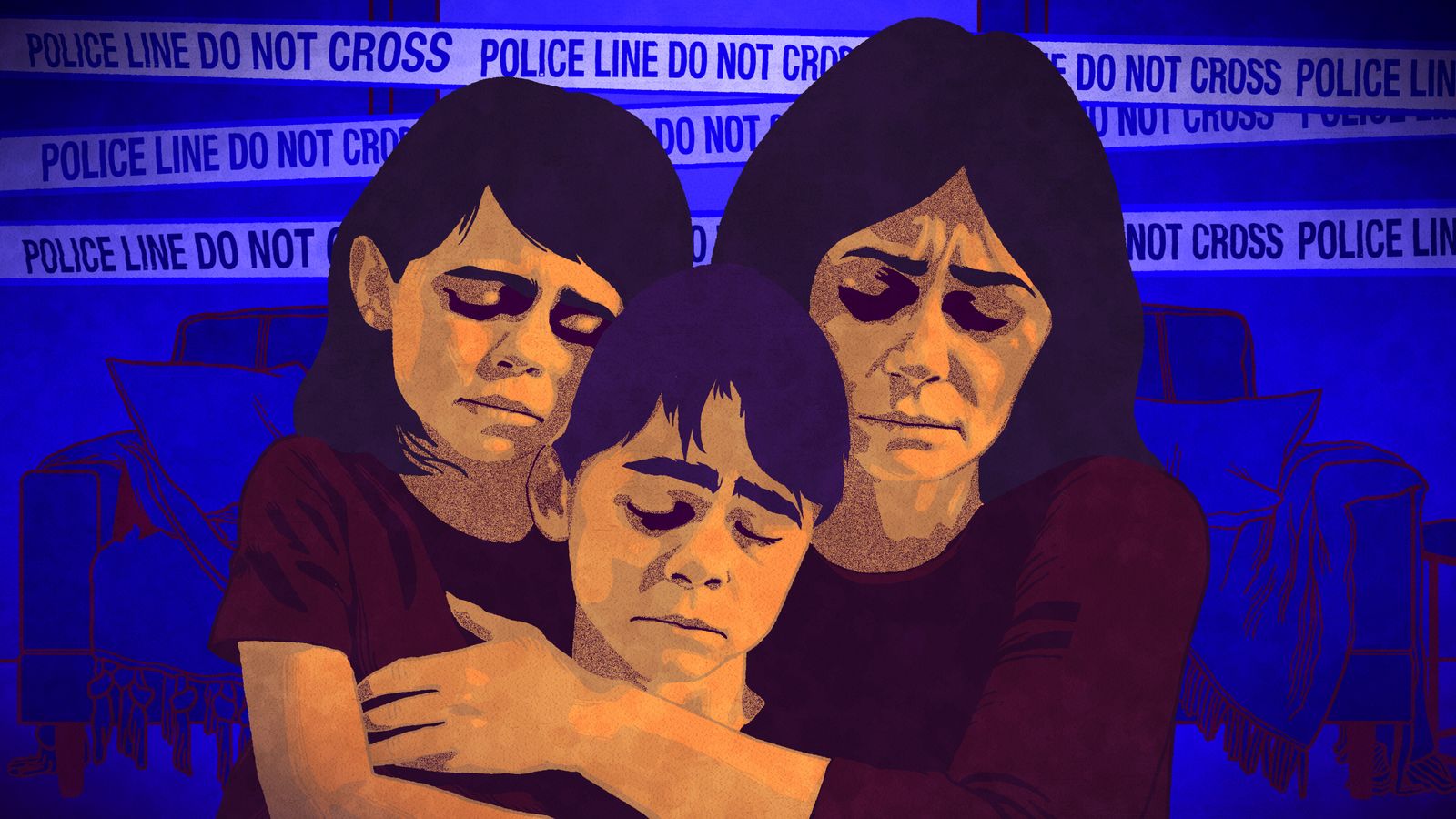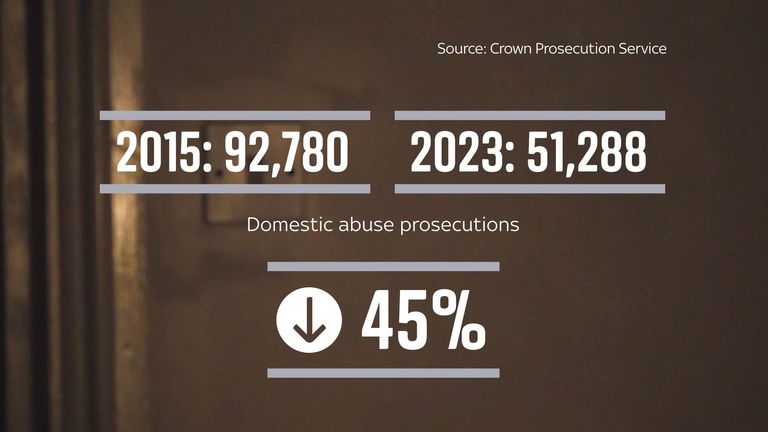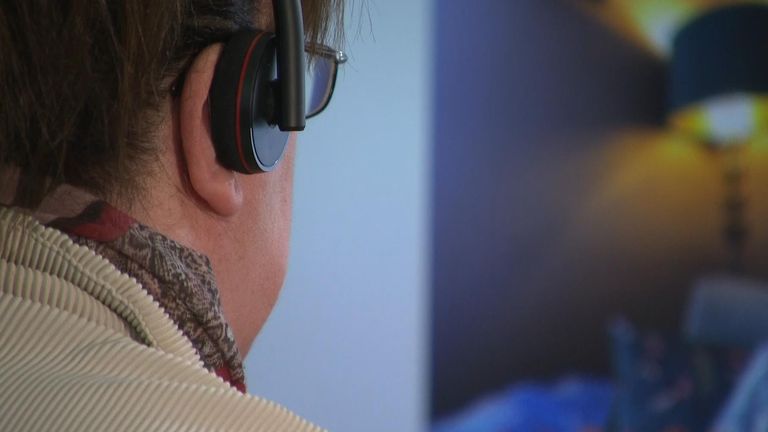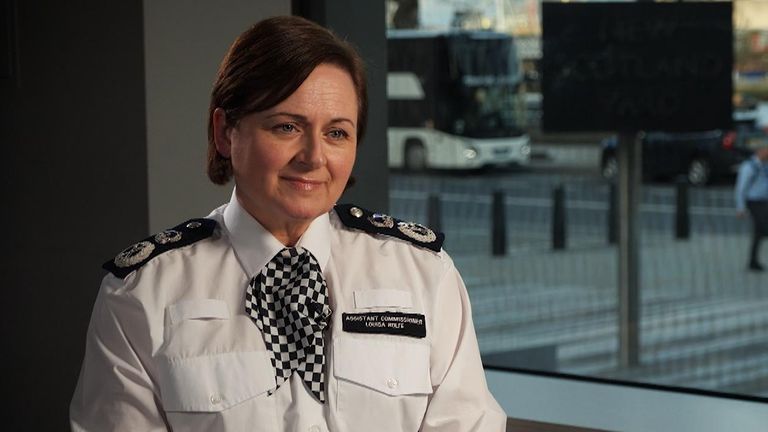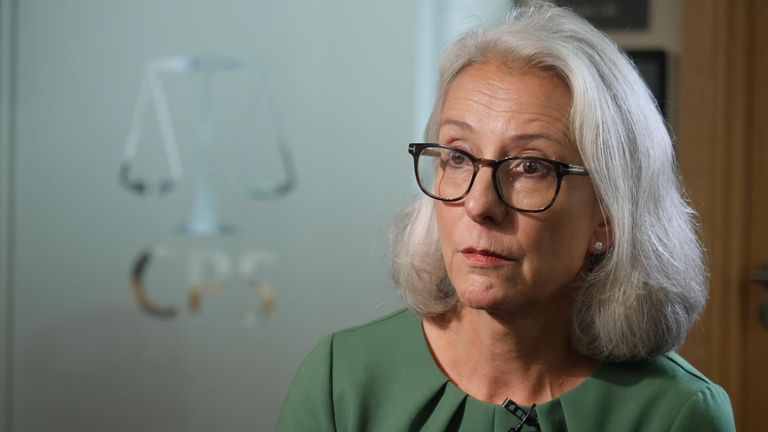Sadie suffers flashbacks of the worst night of her life whenever she smells petrol.
Warning: This story contains descriptions of abuse some readers may find distressing
The scene she describes sounds like something from a horror film – but it was her reality.
She was held hostage in her own home by her then-husband who had their son held at knifepoint. He had doused her home in fuel, with a lighter in his hand, while their young daughter was asleep in the property.
A decade of coercive control had culminated in this.
Sadie (not her real name) feels let down by police after she’d previously reported her partner’s abuse – and she’s not alone.
Victims of domestic abuse say they’re being failed by a criminal justice system which isn’t working.
Prosecutions for domestic abuse-related crimes are down by 45% since 2015 in England and Wales, while thousands of protective orders – designed to prevent perpetrators from contacting victims – are being breached.
Police and prosecutors are now trying to fix the problem – but can it be resolved?
During her marriage, Sadie’s partner installed cameras in their house to monitor her, locked the family inside the property and regularly turned up unannounced at her work – even hiding in the boot of her car.
“If I went shopping, he would time me,” she says. “I’d have to video call him when going round the supermarket.”
After 10 years of her husband’s controlling behaviour, Sadie found the strength to end their relationship.
He was warned not to come back to the family home after being arrested for harassing her, and then released on bail – but he was undeterred.
One evening, Sadie was sat on the sofa watching TV with her son when she saw her ex approaching the house.
Stood in the door frame, he was armed with weapons and petrol so she called the police.
“When he saw the blue lights, he went absolutely crackers,” she says.
Her ex warned that if Sadie had called the emergency services “we’re all going to die tonight”.
“He poured petrol all over the hallway, all the way up the stairs, all the way up the landing,” she says.
“He dragged me and my son into the front bedroom.”
Knife held to boy’s throat
Sadie was screaming, she was petrified. He’d threatened before but it felt different this time.
Hours went by before she tried to escape with her son but her ex grabbed him and held a knife to the boy’s throat.
Stood by the front door, she says police officers pulled her out of the property – but her son was still trapped inside.
In tears, she says: “That’s the guilt I have to live with. I always think that he thinks… I left him.”
The ordeal lasted several more hours before her children were released.
Sadie’s ex was arrested and eventually went to prison for his actions. He was sentenced to just under six years in jail with an indefinite restraining order. But even from prison, he tried to continue to harass her.
He wrote letters and attempted to call her. Once her address was blocked, he’d write to friends and rang neighbours.
He’s now out of prison on licence and Sadie says she’s living in fear.
“I don’t think I’ll ever be free,” she says. “It’s always in the back of my mind. I’m scared. Especially now he’s released.
“Am I going to bump into him? Is he going to contact? Is he going to contact the kids?”
Sharp rise in victims seeking criminal justice advice
Sadie says she reported some of her ex-husband’s abuse to the police over the years but she didn’t feel it was taken seriously.
She believes things could have been different if warnings were heeded.
According to data shared exclusively with Sky News, the National Domestic Abuse Helpline recorded a 40% rise in victims seeking advice about the criminal justice system between 2020 and 2023.
The Charity Refuge, which runs the helpline and is the largest specialist domestic violence charity in the UK, says this reflects a weakening sense of survivor trust in the system – as they’re instead turning to help from charities.
At a domestic violence support group meeting, other women share their experiences of domestic abuse.
They all say the system doesn’t work and that they’re penalised. Some have lost their homes with the abuser living in it. Others have had their children taken from them and told they’d made bad relationship choices.
One woman said the trauma of her abuse is in her head “constantly… every second of every day”.
Another woman says she watches out the window at night, even though she knows her ex is in prison.
Police and prosecutors taking new approach
The feeling of never being able to escape their abuse is a familiar one.
Deborah Jones, who runs the charity Resolute, says protective orders are “not worth the paper they’re written on”.
“A molestation order is not going protect a woman from domestic abuse, when they have fled domestic abuse,” she says.
“No piece of paper is going to do that.”
Police and the Crown Prosecution Service (CPS) are now launching a “Joint Justice” plan to try and change their approach.
It involves a commitment to better collaboration on evidence from the outset to improve charge and conviction rates, as well as reducing the amount of time cases take to get through the system.
They also want to enforce an earlier and stronger use of protective orders for victims. There are various different types issued by the courts to prevent perpetrators from making contact or harassing their victims. But thousands of them are being breached every year.
Read more:
Meet the woman furnishing homes for domestic abuse survivors
Domestic abuse survivors met their ex-partners – here’s what happened
The Joint Justice framework wants to provide more consistent support for victims throughout the process – from reporting their abuse to their case in court.
New technology is also being trialled to make it easier for victims.
At West Midlands Police, there is a specialist domestic abuse desk. Calls get triaged there from the main call centre – and the victim can have a phone call with a specialist officer on phone camera technology. That acts as early video evidence, to save repetitive statements and marked police cars turning up at the home.
There were more than two million reported victims of domestic abuse in England and Wales last year. The government says domestic abuse should be treated as a “national priority” crime – the same as terrorism.
‘Problem is too big’
Assistant Met Commissioner Louisa Rolfe, who is the national lead for domestic abuse, says victims aren’t being fully served by police and prosecutors at the moment “because the problem is too big”.
“I so desperately want to improve what we do,” she adds.
“It’s really important that we understand the scale of this. It is more than 10% of emergency calls to policing. It’s more than a third of violent crime. It’s a huge priority for policing.”
Kate Brown, from the CPS, says authorities need to “do better” and she has concerns about the drop in domestic abuse cases in courts as she wants offenders to see “just outcomes” for their crimes.
“We’re prosecutors, we want to see more of these cases,” she adds.
For Sadie, it’s about support and being taken seriously.
“I had 10 years of abuse that nothing was ever done about,” she says.
“People used to say to me, something bad will happen. That will be the only way you’ll ever get out of it. And it did.”
A spokesman for the police force involved in Sadie’s case said: “Nobody in our communities should live in fear of domestic violence.
“We remain steadfastly committed to continuously improving our work in this area. That has included delivering bespoke training for a large proportion of our workforce.”
:: Sadie is a pseudonym to protect her identity
